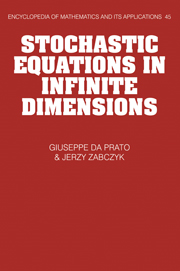Book contents
- Frontmatter
- Contents
- Preface
- Introduction: Motivating examples
- I Foundations
- II Existence and Uniqueness
- III Properties of solutions
- 9 Markov properties and Kolmogorov equations
- 10 Absolute continuity and Girsanov's theorem
- 11 Large time behaviour of solutions
- 12 Small noise asymptotic
- A Linear deterministic equations
- B Some results on control theory
- C Nuclear and Hilbert - Schmidt operators
- D Dissipative mappings
- Bibliography
- Index
11 - Large time behaviour of solutions
Published online by Cambridge University Press: 21 March 2010
- Frontmatter
- Contents
- Preface
- Introduction: Motivating examples
- I Foundations
- II Existence and Uniqueness
- III Properties of solutions
- 9 Markov properties and Kolmogorov equations
- 10 Absolute continuity and Girsanov's theorem
- 11 Large time behaviour of solutions
- 12 Small noise asymptotic
- A Linear deterministic equations
- B Some results on control theory
- C Nuclear and Hilbert - Schmidt operators
- D Dissipative mappings
- Bibliography
- Index
Summary
This chapter is devoted to the existence and uniqueness of invariant measures for solutions of stochastic equations, and to weak convergence of their transition probabilities. We give an almost complete answer to the problem for linear systems with additive and multiplicative noise. Existence and uniqueness of invariant measures for nonlinear equations are studied, under dissipativity or compactness conditions.
Basic concepts
In this chapter we study asymptotic properties of solutions of stochastic equations as time goes to infinity. To fix ideas, let us consider again equation (7.1)
and assume that the hypotheses of either Theorem 7.4 or Theorem 7.6 are fulfilled, and that coefficients F and B depend only on x ∈ H. If ξ is an H-valued random variable, ℱ0-measurable, then the equation (11.1) has a unique mild solution X(t, ξ), t ≥ 0, and our main preoccupation in this chapter will be with the behaviour of laws ℒ(X(t, ξ)) as t → +∞.
Let Pt and P(t, x, Γ), t ≥ 0, x ∈ H, Γ ∈ ℬ(H), be the corresponding transition semigroup and transition function. Thus
and
Let M(H) be the space of all bounded measures on (H, ℬ(H)), and M+1(H) the subset consisting of all probability measures. For any ϕ ∈ Bb(H) and any μ ∈ M(H), we set
It is convenient to introduce at this point the dual semigroup P*t acting on M(H). We have obviously that
Proposition 11.1if ℒ(Ξ) = ν then P*t ν = ℒ(X(t, ξ)). in particular P*t ℒx = ℒ(X(t, x)), t ≥ 0, x ∈ H.
- Type
- Chapter
- Information
- Stochastic Equations in Infinite Dimensions , pp. 302 - 345Publisher: Cambridge University PressPrint publication year: 1992



